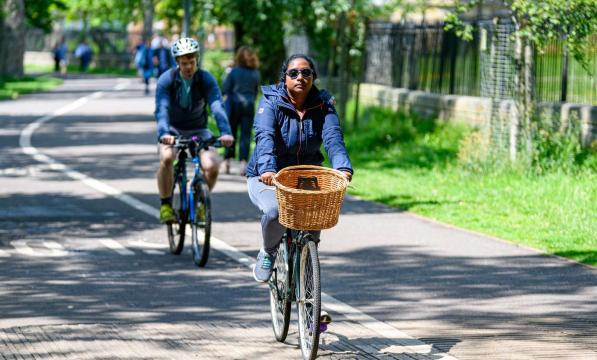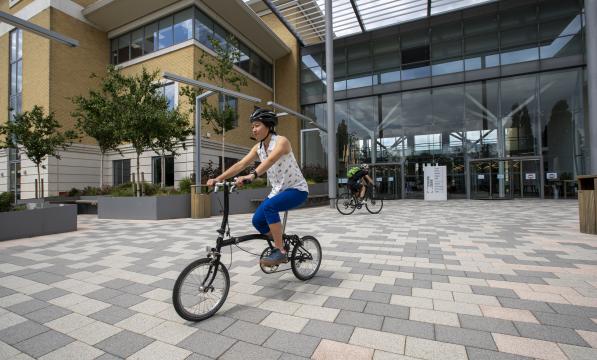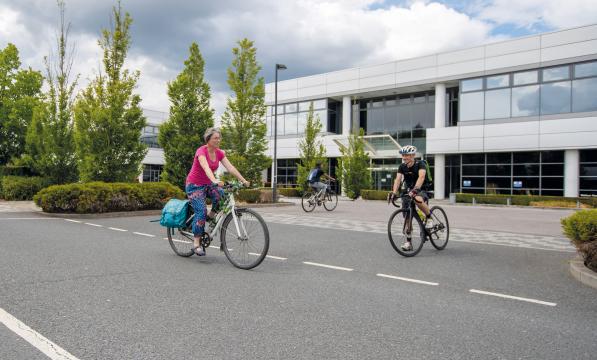Setting up a Cycle User Group in your workplace

What are the benefits of a Cycle User Group?
- To provide a forum for communication between staff and management.
- To provide an open and inclusive social environment whereby staff can be supported to cycle to work and outside of work.
- To give feedback and be 'the voice of the customer' when businesses are planning developments.
- To ensure that staff are heard and consulted with when the local authority is making highway improvements in the area.
- To support the business in increasing the cycle mode share (the percent of people who use a cycle as a transport mode), providing a wide variety of environmental, health, wellbeing, and financial benefits.
Why set up a Cycle User Group?
Some Cycle User Groups (CUGs), sometimes known as Bicycle (or Bike) User Groups (BUGs) are set up to promote cycling throughout the year, providing a single point of contact for all cycle-related issues. They can also provide feedback to larger businesses. This last point is important when business owners are significantly renovating or developing premises. CUGs can be a tremendous resource when monitoring the number of people cycling at a company, or when delivering initiatives outlined in a business’s travel plan.
Keir Bovis, member of the Met Office Bike User Group, which has successfully run for over 20 years, said "Our BUG was initially set up as part of our planning conditions, but also was supported, along with several other large employers, by the Cycling Demonstration Towns project in Exeter. This allowed us to be a conduit between the cyclists, the organisation and the local authority.”
We have been lucky to have several staff engaged in the group who bring a range of skills to make it effective, including diplomacy, pragmatism and determination. Having several members take leading roles helps spread the load and ensure that actions are not forgotten. We also benefit from having an engaged staff group, including lots of new staff who joined the group, keeping the membership energised and fresh.
Robert Dunn, Met Office Bike User Group
Robert Dunn, another member of the Met Office Bike User Group, said they have been “lucky to have several staff engaged in the group who bring a range of skills to make it effective, including diplomacy, pragmatism and determination.
“Having several members take leading roles helps spread the load and ensure that actions are not forgotten.
“We also benefit from having an engaged staff group, including lots of new staff who joined the group, keeping the membership energised and fresh."
One of the critical steps in setting up a group is to decide its constitution and purpose. Who will coordinate the group, how often will they meet, who will be invited, and what will their focus be? This can be individual to each group, but these questions need to be answered to make the group effective.
It's essential to answer these questions at the beginning of the process.
If staff think that this is where all their wishes for a new cycle shelter will come true, they may be disappointed. If management doesn't buy into this process and feels that it's just a place for cyclists to get together and discuss punctures, the CUG won't reach its aim and will ultimately be unsuccessful.
Top tips from the Met Office BUG
Having set up a group nearly 20 years ago, Cycling UK asked Keir Bovis, Camilla Mathison, and Robert Dunn at the Met Office for their thoughts and tips on setting up a CUG in your workplace:
- Having staff from all levels of your business to take part is key, there must be senior level buy-in to the process for it to be successful.
- Making changes can take time, but it's important to be patient, and to have an organisational memory for some of decisions and discussions that have been made.
- Compromise is inevitable - it's worth keeping a record of decisions made, and the reasoning behind them at the time.
- Focus not only on the commute and the everyday cycling, but also the social aspect of cycling. We've been lucky to have a social cycling group as well as the BUG that have supported each other. With the changing patterns of work, and hybrid working, it's more important than ever that groups can support cycling in a range of contexts, not just when commuting.
- Be prepared to reinvigorate and reinvent your group. the initial purpose and forum for which our group was set up was disbanded some years ago. However, we were able to evolve and now have a slightly different focus which enables us to keep the momentum going.
- Look outside your own organisation – where can you work in partnership with others? Reaching out to other groups and the wider community is important and provides feedback to your local authority.
- Succession plan to ensure that the group has new members who provide fresh energy and direction. As people’s careers and jobs change, naturally so might their focus. It’s important that people who have the time, space, and energy to devote to a BUG are given the opportunity.
- Linking the group to wider business targets such as net zero or other environmental goals also support the wider health and wellbeing agenda at work.
How to set up a CUG in five steps:
- Agree to form a CUG between management and staff.
- Agree the purpose and structure of the CUG.
- Develop the constitution, formation, dates for meetings, set up communication channels and ground rules.
- Set the first meeting and promote it widely to all staff. Assign roles and responsibilities and confirm any annual review process.
- Hold regular meetings outlining actions, promotions, monitoring and initiatives to support the group in meeting its aim.
Cycling UK business affiliation
As a member of a CUG, you may use bikes to ride to and from work and can collectively work together to improve conditions for cycle commuters at your place of work. You may also want insurance cover for the rides and events organised by the CUG, which may occasionally include family, friends or members of the public.
Cycling UK’s Business Affiliation provides up to £10m of organisers' liability insurance to cover all cycle-related activities arranged and delivered by a CUG, along with many other additional benefits:
- Bi-monthly copy of Cycle Magazine
- Online support and resources
- Your group page on the Cycling UK website
- Publicity for your rides and events





